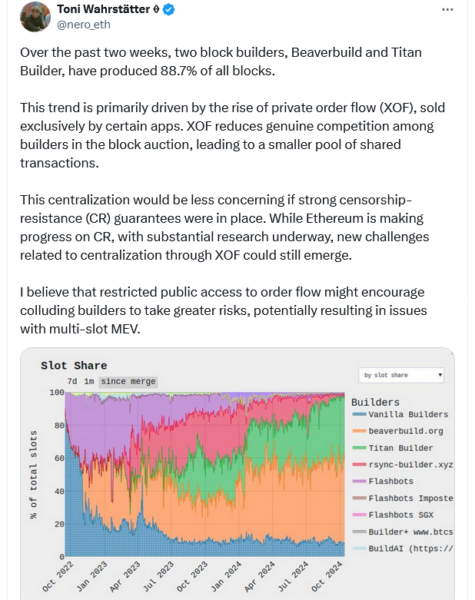Ethereum co-creator Vitalik Buterin pitched several solutions to help Ethereum minimize block production and staking centralization through the “Scourge” phase of Ethereum’s technical roadmap.
In an Oct. 20 post, Buterin expressed concern that economies of scale within staking have resulted in small staking pools leaving for larger pools, while two entities built 88% of Ethereum blocks over the first two weeks of this month.
Buterin stressed that staking centralization poses “one of the biggest risks” to Ethereum and could lead to a higher risk of transaction censorship and “other crises.” He said:
“One of the biggest risks to the Ethereum L1 is proof-of-stake centralizing due to economic pressures.”
Buterin said the 30% of Ether currently staked is already more than enough to protect Ethereum from 51% attacks, but additional risks would arise if almost all Ether were to be staked.
Staking would become less of a “profitable task” and impose more obligations on Ether holders, Buterin said, adding that the slashing mechanism would weaken and a liquid staking token could take over “money” network effects from Ether.
To handle these issues, Buterin recommended capping the amount of Ether a user can stake and limiting staking penalties to 12.5% of staked Ether.

This could be achieved via a two-tier “risk-bearing” (slashable) and “risk-free” (unslashable) staking model.
His concerns over block production centralization come after Ethereum Foundation researcher Toni Wahrstätter recently pointed out that two Ethereum block builders — Beaverbuild and Titan Builder — had built 88.7% of all Ethereum blocks over the first two or so weeks of October.

Ethereum follows the proposer-builder separation method for block construction. Builders create blocks for the proposer to review, often choosing the most profitable one.
However, assigning “specialized” tasks to specific actors has led to centralization problems, Buterin said.
While Ethereum’s security isn’t at risk, Buterin said the issue could lead to worsening transaction censorship and force Ethereum users to wait up to 114 seconds for block inclusion instead of 6 seconds.
This delay could give block builders more time to extract user revenue via sandwich attacks or give rise to “significant market manipulation” with decentralized finance liquidations.
Buterin pitched a “fork-choice-enforced inclusion lists” proposal in which the task of choosing transactions would return to the proposer or staker, and the builder would only choose how the transactions are ordered (in addition to inserting some of their own).
An alternative solution is “BRAID,” a proposal that splits the block production process among several actors, with each needing only a “medium amount of sophistication to maximize their revenue.”
Source: https://cointelegraph.com/news/buterin-proposes-solutions-ethereums-centralization-woes



